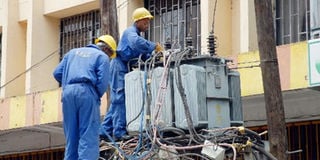Premium
Electricity generation hits record 1.134 billion units

Kenya Power employees fixing a transformer. Electricity generation hit a record high in January signalling increased demand for power, especially by industrial customers despite the high prices of the energy that have forced consumers to dig deeper into their pockets.
What you need to know:
- Electricity generation hit a record high in January signalling increased demand for power, especially by industrial customers despite the high prices of the energy.
- Data from the Epra shows that power generation hit a record 1.134 billion units last month beating the previous record of 1.121 billion units set last year.
- The figures include the entire load of electricity generated by the State-owned KenGen and independent power producers (IPPs) and bought by Kenya Power during the month.
Electricity generation hit a record high in January signalling increased demand for power, especially by industrial customers despite the high prices of the energy that have forced consumers to dig deeper into their pockets.
Data from the Energy and Petroleum Regulatory Authority (Epra) shows that power generation hit a record 1.134 billion units last month beating the previous record of 1.121 billion units set last year.
The figures include the entire load of electricity generated by the State-owned KenGen and independent power producers (IPPs) and bought by Kenya Power during the month.
However, actual consumption is lower than the above figure taking into consideration system losses including technical losses and electricity theft, which currently take up about 23 per cent of all power bought by the utility.
“Total units generated and purchased including hydros, excluding exports in January 2023 (is) 1.134 billion kWh (kilowatt-hours),” said Epra Director-General Daniel Kiptoo in a Friday gazette notice.
Power charges increase
Power charges rose sharply in September last year after President William Ruto withdrew a subsidy that had kept prices constant since December 2021 leading to public outcry.
The higher power prices – coupled with similarly high fuel and food prices – helped push inflation to a five-year high of 9.6 per cent in October heavily hitting households and businesses.
Epra further last month raised the inflation-adjusted cost component of the power bill to 85 cents per unit from 67 cents per unit arising from the high inflation further pushing up prices.
Higher consumption, however, indicates that customers especially industrial clients and other commercial entities did not reduce their power use following the increase in prices last month.
Commercial customers are the largest consumers of electricity in Kenya making up some 70 per cent of the total power use, and increased consumption typically indicates that economic activities have picked up thereby raising demand.
Rising electricity prices have, however, forced many firms to adopt alternative energy sources with many generating their power from hydro, solar, biomass, and other sources to cut their energy bills.
Epra recently said that some 106 companies have so far been licensed to generate their electricity with a total capacity of 260.22 megawatts (MW) and that another 15 firms have applied for licenses with a power generation capacity of up to 197.5MW pending approval.
This includes large power users such as British American Tobacco (BAT), Unilever Tea Kenya, TotalEnergies Kenya, Simba Cement Limited, National Cement, Bidco, and Africa Logistics Properties (ALP).





